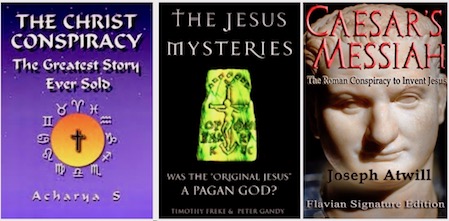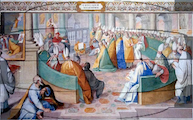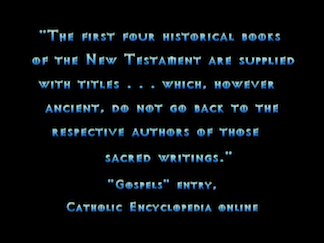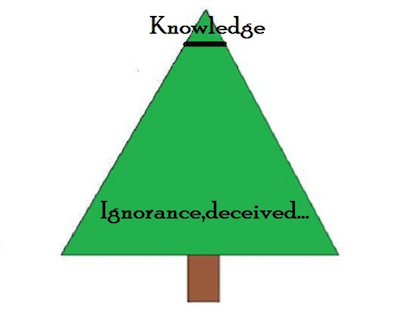
Jesus: I have clear childhood memories of receiving some pretty darn serious ultimatum threats! I’m talking about the times I remember when, like many kids, I was severely told not to behave in certain ways in my life or otherwise I could when I die go to hell as a consequence. Indeed, besides the threat of not walking the white line I was also told to believe in Jesus or run the risk of facing eternal damnation…
For many years well into adulthood, there was something about all this that didn’t stack up right for me. Because of my religious programming/indoctrination it took me a long time to see right through it all. However, after many years of looking into it (on and off), I came to the overwhelming conclusion that the whole Jesus, heaven and hell thing was a massive deception.
I do not wish to offend anyone of religious standing, in fact, my respect goes out to you should you be that way and I still accept that humans are essentially spiritual beings , but this is a very brief account of how I came to reach this conclusion. Will you accept or greatly doubt the account you’re about to read? Either way, I encourage you wholeheartedly to do your own research.
Is it possible to step outside of religious programming/indoctrination and question the unquestionable by asking did Jesus really exist?

A number of excellent authors/researchers have (see photos at top of pg1). Their groundbreaking well documented books have led them to come to the same conclusion as I have, that the New Testament Jesus character never existed. All works by these authors and the reasons for this conclusion are basically the same and can be summarised with 3 points.
Whether the Bible is used as a guideline or not, the search for the historical evidence of the New Testament Jesus, be it in written, archaeological or geographical form has basically drawn a blank.
Even the biblical places where Jesus supposed to have walked such as Nazareth, Bethany, Capernaum, and Calvary…etc show no evidence for the existence during the so called New Testament times. For example, Nazareth can only be dated as far back as 350CE. Can you imagine the look of bitter disappointment on the local tourist industry’s faces after the immense amount of excavating showed nothing earlier than 350CE?! The oldest ruins did not even reveal the name of the village. Was it later called Nazareth to make it look as if it was the place where Jesus spent his childhood?
Eminent Jewish historians such as Philo, Justus of Tiberius and dozens of others who lived in the area when the New Testament was supposed to have happened produced many volumes; enough to fill a library detailing the events of the times gave no mention to a Jesus character.
Log books recording events were kept and meticulously filled in documenting day to day handling of the Roman Empire. From this there was plentiful evidence for the existence of Pontius Pilate, but in spite of the attention it was supposed to have caused (according to the New Testament) there was not a single mention of Jesus’ trial.
Christian apologists mention written passages in Josephus’ “The Antiquities of the Jews” and Tacitus’ “Annuls” as irrefutable historical evidence for the existence of Jesus but under careful scrutiny these passages have been dismissed by scholars as obvious forgeries.
The major events in Jesus’ lifetime for examples; the prophesised messiah born 25th December, virgin birth, had 12 disciples (or helpers), performs miracles such as turning water into wine, causes a great political stir, gets crucified between 2 thieves and soon rises from the dead… etc can be found inearlier writings based on many fictional / mythological characters. Here’s a list of some of these pagan/Gnostic ‘god men’ I’m referring to with their identical biographical motif.

Other examples are Adonis, Apollo, Heracles (“Hercules”) and Zeus of Greece, Baal of Phoenicia, Bali of Afghanistan, Hesus of the Druids, Indra of Tibet/India, Odin of the Scandinavians, Quetzalcoatl of Mexico, Tammuz of Babylon and Zoroaster of Persia…
All these individuals were also each described as moral and humble, said to be the son of God, the light and the way… died for the sins of the world…etc

So, basically, it has been said that what really happened was this. Under the auspices of Emperor Flavius Constantine (c. 274 – 337) the Roman Empire used those mythological god men characters with their biography (born 25th Dec, virgin birth…etc) to invent the New Testament Jesus character and form a centralised religion, which occurred as late as 325:

The infamous ‘Council of Nicaea’ in 325 hallmarked this.
Over the years the Roman Empire won the battle to establish their centralised religion with the New Testament and its literalist Jesus character (so-called literalist because they claimed that Jesus literally existed). They did it for power; political and financial gain. It mustn’t be forgotten that the Vatican is one of the richest most powerful organisations on the planet.

The god men that predated Jesus had always been known as fictional characters: Their same life-story was a metaphorical one. It was an allegory; a story representing spiritual transformation from suffering. The ancient Pagans or Gnostics aware of this had different levels of realization of how the spiritual transformation could occur through the various related initiations and practices.
The Pagans/Gnostics with their metaphorical god men and spiritual practices were either destroyed or banished into oblivion by the power-hungry Roman Empire determined to achieve religious supremacy and put a lid on the sources from where they stole ideas.
Even before their banishment the Gnostics complained how the new Christian religion was a greatly ‘watered down’ version of their spiritual practices and its effects.
The murderous Constantine I (photo page 3) only became a Christian just before his death. He only did this so that it would look appropriate for the Emperor to be seen belonging to the newly founded Christian religion. In truth and secret he really was a sun god worshiper: Doesn’t this indicate that Jesus never existed to win him over?!
If Jesus the long awaited Jewish Messiah really had existed wouldn’t it have taken the Romans a lot longer to accept Christianity since the Jews were their enemy..?

Catholic Encyclopaedia admitting inauthenticity of the gospels authors
The gospels are also said forgeries adapted from hundreds written by Pagans or Gnostics. Hence the 4 gospels that ‘made it to the world’ have been called the canonical gospels.
The gospel of Mark, the oldest gospel, was probably not completed until around 90CE. The others Matthew, Luke and John came much later and did not emerge until around 180CE. Justin Martyr 100-165 CE one of the most well known literalist Christianity advocates never mentions any of the gospels in his writings. The fact that the gospels arrived much later than Jesus’ so called death is not the only reason why they could not have been eyewitness testimonies.
Someone once told me that those who believe in the gospels could never have read them because if they had they would have dismissed them as false claims due to the many contradictions, errors and inconsistencies.
Here are just some of those irreconcilable contradictions, errors and inconsistencies
Contradictions or errors in the gospels
“If I [Jesus] bear witness of myself, my witness is not true.” (John 5:31)
“I [Jesus] am one that bear witness of myself…” (John 8:18)
Inconsistencies – Where the gospels don’t agree
According to Matthew & Mark it was: ‘My God, my God, why have you forsaken me?’
Luke however, says that Jesus’ last words were ‘Father into your hands I commend my spirit.’ Then according to Luke it was ‘I am thirsty.’ Followed by, ‘It is finished.’
‘His friends come to Jesus’ tomb, but the doorstone is rolled away and one angel sitting on the outside gives the news to them before they go in.’ (Matthew 28:1-8)
‘His friends come to the tomb, go inside, find nobody, are perplexed, and then two men give them the news.’ (Luke 24:1-4)
I’ve decided to make this is subject for another day but the Acts of the Apostles can also be described as a fantasy story full of contradictions, errors and inconsistencies.
Bible forgeries
Well into the 4th century after the Council of Nicaea, scriptures became profoundly unreliable due to the new literalist Christian movement established by Emperor Constantine with his propaganda merchants such as Bishop Eusebius (260-340CE)…

-And there you essentially have it, what has been said to be one of the greatest deceptions in the history of mankind. Don’t get me wrong, the deception started and only occurs at the top of the hierarchical tree in the Vatican. Those below are mainly decent people, unaware of the unholy secrets, lies and ulterior motives harboured over the years.
I’ll leave you with 2 quotes. The 1st is from ‘The Jesus Mysteries’ written Peter Gandy & Timothy Freke (actually, it’s the dedication they give to their book) and the 2nd is from the Bible.
‘This book is dedicated to the Christ in you’
‘And the truth shall set you free.’
Highly Recommended
The Christ Conspiracy – S. Acharya
The Jesus Mysteries – Peter Gandy & Timothy Freke
Caesar’s Messiah – Joseph Atwill
Where Jesus Never Walked – Frank R. Zindler
Forgery in Christianity – Joseph Wheless
The Antiquities of the Jews – Josephus
Annuls – Tacitus
The Empty Cross – Why Jesus Didn’t Exist DVD
The World’s Sixteen Crucified Saviours – Kersey Graves
The Bible – Various versions
